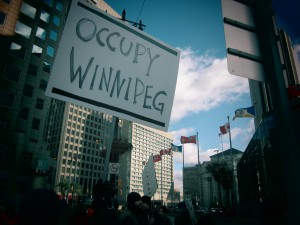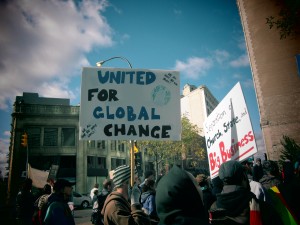By David Jacks

October 15, 2011 Occupy Winnipeg – Photo by David Jacks
Occupy Wall Street, a social movement originating in the United States in response to the growing inequalities and inequities under the current profit-driven global economic system has spread across the world, and, on October 15th, reached as far as right here in Winnipeg.
Many have accused the Occupy Wall Street movement for not having a single, unified message that can fit squarely in a newspaper headline, or be easily understood by decision-makers and the public alike, though “we are the 99%” makes sense to most.
Being a part of the 99% means that we don’t have just one simple issue to address: poverty, racial and gender discrimination, legacies of colonization, the growing divide between rich and poor both in terms of income inequality in North America and the divide between the Global North and South, the (un)ethical practices of multinational corporations and financial institutions, and the continued unsustainable resource extraction and degradation of the environment; it means that we have a multitude of issues that are being ignored by our governments, and that it is time our collective voices are taken seriously.

October 15, 2011 Occupy Winnipeg – Photo by David Jacks
From an environmental lens, the Occupy Wall Street movement is calling for corporations and governments to take responsibility for the damage they have collectively caused to the environment, and to immediately take action by ceasing continued unsustainable practices. Here in Canada, the exploitation of the Alberta and Saskatchewan tar sands come to mind immediately, as well does the effects of global warming on flora, fauna and communities in the North – but there are countless others, from lack of garbage, recycling and active transportation plans in our cities, to the desecration of our watersheds by unsustainable agricultural practices.
If you missed the opportunity to attend the Occupy Winnipeg event, there are still many ways that you can make a major impact.
The Occupy Wall Street movement relies on both collective and individual action, globally and locally:
- Taking simple steps at home when you make your purchasing decisions: rethink, reduce, reuse and recycle.
- Write a letter to your Member of Parliament, expressing your anger about the Athabasca tar sands.
- Write to your MP, calling on the reinstitution of funding for the Canadian Environmental Network.
- Learn more about international trade agreements like NAFTA and CETA, and how they will affect your community.
- Switch your financial institution to a local credit union.
- Boycott businesses that maintain unethical business practices such as sweatshops, child labour, and unfair wages. Buy from a local business or union shop.
- Join an environmental community group, and volunteer your time once or twice a week.
As the 99% we too have responsibilities. We have the responsibility to hold our governments accountable, while we also have the responsibility, as consumers, to make sustainable and ethical decisions on how we choose to live our lives.
The Occupy Wall Street movement will not end when the protesters go home: it will be the beginning.



Trackbacks/Pingbacks